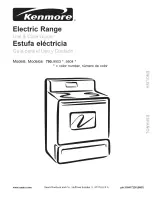
24
Setting Oven Controls
Cleaning the Oven
A self cleaning oven automatically cleans itself by using much
higher temperatures than those used for cooking. The self clean
feature eliminates soils completely or reduces them to a fine
powdered ash that, when the oven has cooled, can be wiped
away easily with a damp cloth.
The self clean function provides a default 3 hour clean time set-
ting for self cleaning.
When the oven is set to run a self-clean cycle, the motor door
lock will begin locking the oven door. Do not open the oven door
while the lock motor is running or when any locking indicators or
displays are showing. The oven door is completely locked in
about 15 seconds.
All oven racks, rack ladders, and accessories must be removed
from the oven interior when the oven is cool prior to self clean to
avoid possible damage. If the oven racks are not removed they
may discolor.
Do not touch the oven during the self clean cycle. Keep children
away from the oven during the self clean cycle. Failure to follow
these instructions can result in burns.
The health of some birds is extremely sensitive to the fumes giv-
en off during the self clean cycle of any range. Move birds to an-
other well-ventilated room.
Do not line the oven walls, oven racks, oven bottom or any other
part of the range with aluminum foil. Doing so will stop heat dis-
tribution, produce poor baking results and may cause permanent
damage to the oven interior. Aluminum foil will melt to a hot oven
surface during self clean.
Do not spray oven cleaners or protective coatings in or around
any part of the oven interior.
The oven may appear to have cooled off after use. The
elements may still be hot and burns may occur if the oven
surface is touched before sufficiently cooling.
The Luxury Glide™ oven racks must be removed when the oven
is cool before starting self clean to avoid damaging the glide
ability of the rack. The
Clean
and
-Remove Racks
indicator
lights will flash as a reminder to remove the racks before starting
a self clean cycle. Refer to
“Arranging, Removing, and Replacing
Oven Racks” on page 15
for instructions for removing and
replacing all racks.
Do not force the oven door open when self clean is active. This
can damage the automatic door-locking system. The door will
not unlock until the oven has sufficiently cooled. Use caution
when opening the door after self clean cycle is complete; the
oven may still be very hot.
IMPORTANT! Read and adhere to the following precau-
tions before starting self clean:
•
Completely remove all items from the oven and cooktop
including food, cookware, utensils, plastic, all racks, and
any aluminum foil. Aluminum foil will not withstand high
temperatures generated during the self clean cycle.
•
Do not leave small children unattended near the appliance.
During self clean, the range will become very hot to the
touch.
•
Be sure the oven vent is clear.
•
Be sure oven light shield is in place.
•
Remove any excess spills or loose debris. Spills on the
oven bottom should be wiped up and removed before start-
ing self clean
.
To clean, use hot, soapy water and a cloth.
Large food spill overs can cause heavy smoke or a fire dur-
ing self clean. Spills that have a high sugar or acid content
(such as milk, tomatoes, sauerkraut, fruit juices or pie fill-
ing) may leave a dull spot even after self cleaning.
•
Do not clean the oven door gasket
(
Figure 24
). Do not use
any cleaning materials on the oven door gasket. Doing so
may damage the gasket. The woven material of the oven
door is essential for a good seal. Care should be taken not
to rub, damage or remove the door gasket.
•
Do not use commercial oven cleaners or protective
coatings of any kind inside oven. Residue from oven
cleaners may damage the porcelain during the next self
clean cycle.
•
Clean any soil from the oven exterior. Clean using soap and
water before starting a self clean cycle. If soils are not
removed, they may burn on due to the high temperature
during self clean.
Figure 24: Areas of oven door to clean with caution












































